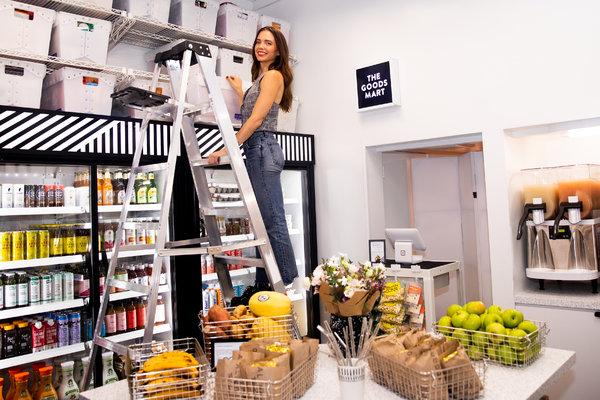Rachel Krupa, a publicist, wants to hit pause on the Amazon Dash button.

Rachel Krupa in her store the Goods Mart in Manhattan. The Goods Mart is a do-good convenience store started by the Los Angeles publicist.CreditKatia Repina for The New York Times
By Sheila Marikar
You’ve heard of conscious uncoupling. But a conscious convenience store?
Thus aspires the Goods Mart, which opened on Lafayette Street in SoHo on Monday, in a narrow space formerly occupied by a shop that served desserts in Mason jars.
Instead of Cinnamon Toast Crunch cereal in dusty aisles, here there is cinnamon toast-flavored “crunchy superfood clusters.” Instead of Pepsi and Coke, there is kombucha and some kind of CBD drink. There are no single-serve plastic bottles, as at the 48 7-Elevens around the city; there is no cat (alas), as at the local grocer. It’s like a compressed version of Whole Foods, but without the compromised feeling of Amazon ownership.
CreditKatia Repina for The New York Times
The Goods Mart was founded by Rachel Krupa, 38, a publicist who saw social opportunity in mundane shopping. “More than anything else right now, we want to know who our neighbors are, we want to talk to people, we want to have this connection,” Ms. Krupa said. “You can have that sometimes by going to a bar, but you can also have it with your everyday staples.”
Though not so much, perhaps, by getting them from a much-chastised vending machine company initially named Bodega, after the cherished New York institution, to widespread derision.
Ms. Krupa is a convenience-store nostalgist, having frequented one in the Sunoco gas station in her small hometown in northeastern Michigan. “It was that hub where you’d run into high school friends or neighbors,” she said. “If your mom said, ‘Go get milk,’ you’d go to get out of the house and see who else is there — is the guy that you’re crushing on getting gas?”
In 2010, she started Krupa Consulting in Los Angeles, a firm that specializes in the promotion of eco-conscious brands of food and home goods. Ms. Krupa missed having that local hangout where she could pick up snacks and catch up with people in the community, and last year came up with the idea of a healthy convenience store, where she could make available a carefully chosen selection of products and offer shelf space to new brands, some of which she also represents.
“Bodegas have some great products, but they also have all of the other things,” she said, meaning conventional candy and soda. “It makes your process of selecting what you want much harder.”
“Cosmetically-challenged produce” for sale at the shop.CreditKatia Repina for The New York Times
Everything the Goods Mart sells is non-G.M.O. and free of artificial flavors, preservatives and dyes. Some are organic or locally made. Ms. Krupa is trying to cull the offerings so shoppers don’t succumb to a paralysis of choice. “Instead of having 50 kombuchas, we have six or seven,” which, she admitted, “is still a lot.”
The first Goods Mart opened in April in the Silver Lake neighborhood of Los Angeles, down the street from A.P.C. and Aesop stores, next to a low-priced carwash. Besides highfalutin versions of household staples (bamboo toothbrushes for $6.95, organic packaged ramen for $2.75), the Los Angeles Mart has a bulletin board advertising volunteering opportunities and trivia nights.
There is also a leafy green lounge, where, on a recent Saturday, people placed their laptops on repurposed buckets and tasted free samples of small-batch cottage cheese.
The Los Angeles store accepts E.B.T. cards, issued by the state welfare department, and Ms. Krupa is waiting on government approval to do the same in New York. Produce past its prime, sourced from local farms, gets donated to homeless shelters, she said, where it can be used as ingredients in other food.
Goods Mart shoppers are prompted to tip a percentage of their bill upon checkout, and every month the store donates the tips to a local nonprofit. (NYC Parks Stewardship will be its first New York beneficiary.)
Ms. Krupa and a customer at her store.CreditKatia Repina for The New York Times
“She emailed us, introduced herself as the owner of this new business and told us about this practice they had instituted of donating tips,” said Tina Christopulos, the co-chairwoman of fund-raising at Micheltorena Elementary School, a block away from the Silver Lake store. “I was concerned, at first — would we be taking tips away from employees? She explained it further, and I was astonished, by the end of June, that they had raised over $1,000 for us.”
“I have stopped in half a dozen times,” Ms. Christopulos said. “They have delicious burritos,” made by the restaurant Burritos La Palma, which was praised by the food critic Jonathan Gold. The other co-chairwoman of Micheltorena is a fan of the organic kombucha slushie — like a Slurpee, but without the high-fructose corn syrup.
Last month, Ms. Krupa organized a happy hour for the school’s students and gave out 100 organic Popsicles. On Oct. 27, the New York store will lead an outing to weed and add mulch to trees planted in SoHo. In September, Ms. Krupa leased an apartment on Mott Street, and she is continuing to work at her firm’s New York office.
She hopes eventually to arrive in the middle of the country, she said, “where there’s less access to the better options. If we could pop up on a heavily trafficked highway stop, or a place where younger families are starting to move, that’s where we could really make a difference.”







